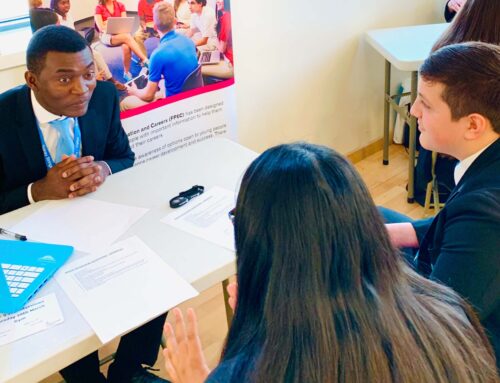
Undertaking CPD is not just about going on a course; being open to trying new ways of learning is an important skill to develop. Last time in the A-Z of CPD series we looked at a range of different activities from ‘action research’ to ‘conferences’. This week we help you consider alternative activities that you can do as part of your own continuous professional development, starting at the letter ‘D’.
Taken from CPD for the Career Development Professional by Siobhan Neary and Claire Johnson.

D
DAILY WORK
What this is:
Anything you do as part of your work role.
How can this be used as CPD:
In some respects every day can be seen as a training day. Being alert to naturally occurring opportunities to develop your learning is a skill worth developing. For example, a casual conversation with a colleague in which they share some useful information; or a chat over lunch about an article you have read, what you learned and how you are now using this information, which then leads to further conversation on other ways of using this information, can be seen as CPD. If you also develop the habit of writing this down in a CPD record then the act of actually recording it can help to reinforce the learning.
E
ETHICAL CASE STUDIES
What this is:
These have been produced by members of the CDI Professional Standards Committee (PSC) and use a framework to approach a series of ethical issues based on the 12 principles in the CDI Code of Ethics.
How can this be used as CPD:
You could read one of the case study scenarios, think through how you would approach this situation and then read what the PSC members suggest. Alternatively, you could write an ethical case study of your own and use the framework to structure your response.
Useful examples/websites:
EVALUATION
What this is:
Evaluation is a process that helps to assess whether something has worked and if it has achieved its aims and objectives. It is often used in research to assess if projects have achieved what they set out to do, and, if not, why not. It is a process that focuses on identifying learning from systematically reviewing an activity.
How can this be used as CPD:
You may want to evaluate how a training course you have attended has helped to develop your practice. Assess what the course was meant to deliver and if this has actually happened for you.
Useful examples/websites:
EXPERIENTIAL LEARNING
What this is:
Experiential learning is the process through which an individual learns through the act of doing. It is closely linked to reflection and facilitates the development of practice through real life activities. David Kolb has written extensively about this.
How can this be used as CPD:
All new activities can provide an example to learn. For example, you may learn about applying for jobs online by completing an online application form.
Useful examples/websites:
- http://infed.org/mobi/david-a-kolb-on-experiential-learning
- www.businessballs.com/self-awareness/kolbs-learning-styles
F
FORMAL QUALIFICATIONS
What this is:
These are qualifications that are accredited and awarded by a university or awarding organisation.
How can this be used as CPD:
Having determined your CPD needs, you may decide to undertake an accredited qualification. You may wish to do a full qualification or, if available, units or modules from one that meets your particular needs.
Useful examples/websites:
G
GOOGLE BOOKS
What this is:
Google Books is a service from Google Inc. that searches the full text of books and magazines that Google has scanned, converted to text using optical character recognition, and stored in its digital database. Books are provided either by publishers and authors, through the Google Books Partner Program, or by Google’s library partners, through the Library Project. Additionally, Google has partnered with a number of magazine publishers to digitise their archives.
How can this be used as CPD:
Simply putting career development into the search facility will bring up a whole list of books on this subject, or you may prefer to search by title. Reading a book or chapter can be a useful source of knowledge and you can reflect on what you have learned and how you can use this in your practice.
Useful examples/websites:
GOOGLE SCHOLAR
What this is:
Google Scholar is a freely accessible web search engine that indexes the full text or metadata of scholarly literature across an array of publishing formats and disciplines.
How can this be used as CPD:
You can use this to search for academic literature on a variety of topics. Abstracts are provided that describe the main content of the publication. Sometimes this will be for a publication that can be downloaded for a fee. At other times you may find a free-to-use pdf version of the publication that you need. Simply putting career development into the search function will give you an idea of the wealth of academic literature available.
Reading a book or an article can be a useful source of knowledge, and you can reflect on what you have learned and how you can use this in your practice.
Useful examples/websites:

Emma Davies works within the editorial department at Trotman Publishing. Graduating from her Masters degree in 2017, she is familiar with all aspects of the student journey through university. She is passionate about helping students find the right career, and was a member of the SYP’s inaugural committee in the South West.





